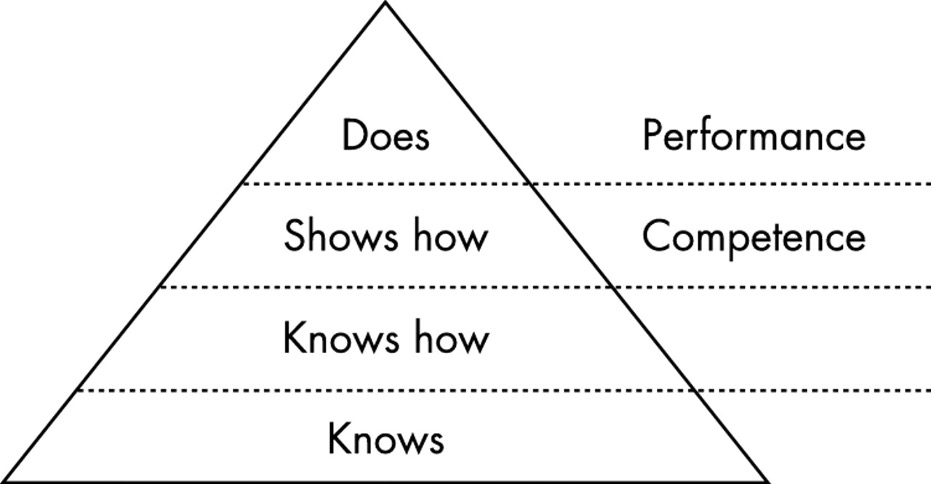AKT/MCQ Exam Tips and Techniques

AKT & MCQ Exam Tips and Techniques
If you are currently studying, or preparing to study, for the RACGP or ACRRM Fellowship exams, you will be aware that there are several written exams that you need to complete. For RACGP Fellowship candidates, these are the Applied Knowledge Test (AKT) and the Key Feature Problem (KFP) exams.
The KFP is designed to assess how you apply your knowledge to clinical scenarios, whereas the AKT is designed to test the extent of your knowledge in a single best answer, multiple choice format.
Most registrars seem to spend a lot of time studying for the KFP, however, the AKT is an important exam too!
ACRRM also has a multiple-choice written exam – MCQ.
When assessing clinical competency according to Miller’s Pyramid of Assessment, the AKT/MCQ forms the base of the pyramid ‘knows’, the KFP forms the second tier ‘knows how’, and the clinical competency exam (CCE) assesses the top two tiers of the pyramid ‘shows how’ and ‘does’.

Here are some tips and techniques that can help you get through the AKT exam with the highest mark possible.
- Read the whole question AND all of the options first before selecting an answer. This is in case there is an option that is ‘more’ correct – RACGP exams have been known to have 2-3 ‘correct’ answers, but 1 is more specifically correct compared to the others which may be more general/less specific to the case. It can also be helpful to have an answer in mind before reading all of the options available.
- Make sure you read the question carefully and always answer what is being asked. Research has found that we have the tendency to read the beginning and end of every sentence and skip the middle, because it’s quicker (we just guess or make assumptions about the middle section). This tendency can be exacerbated when you’re nervous or anxious. So, it’s important to read every word in the question to ensure all the information is read and taken into account. For example, an ‘initial investigation’ may be very different from ‘the most important investigation’. Misreading the question is one of the easiest and most common ways to lose marks. It is recommended that you read the question a few times to ensure you are answering what has been asked. Make a habit of doing this when practicing multiple choice questions so it’s incorporated into your exam technique.
- Always take the context of the clinical scenario into account – this includes information such as the age, gender and location of the patient. For example, the way you assess or manage a patient may be different depending on whether you are in an urban or rural/remote location.
- Flag all questions you are unsure of so you can return to them later. At the beginning of the exam nerves and anxiety can impede concentration and focus, so while some questions may appear difficult at first, if you come back to them once you have settled into the exam, the answer may be more obvious. So, always answer the easiest questions first, flag any difficult or uncertain ones, and go back to them at the end. Answering easiest questions first allows any anxiety to settle, builds confidence, and tends to allow the mind to get into the flow of the task at hand. And remember, if you are having difficulty with a question, try to imagine yourself in your own clinical practice – how would you approach this problem in your day-to-day general practice?
- Leave no questions unanswered – even if it’s a guess! There is no penalty for wrong answers in this exam, so it does not make any sense to leave questions blank. Just have a go!
- Some tips on time management during the exam:
- Calculate how many questions you should complete every 30 minutes to ensure you keep pace and don’t waste too much time on one question as they are all worth the same (e.g. finish ¼ of the questions at ¼ of exam time passed, finish ½ of questions when ½ of exam time has passed, etc.).
- Leave time at the end of the exam to check any flagged questions and your answers generally – we suggest a minimum of 15 minutes (30 minutes is ideal).
- Check the first 5-6 questions you answered if you have time (as nerves may have affected your concentration and focus). Remember: if a question is too difficult, flag it and move on (don’t waste time on it). This helps with your nerves and your time management.
- Use Heuristics “rules of thumb” = write the most useful heuristics down at the beginning of the exam as a visual reminder to yourself. You can also say these heuristics to yourself as you practice multiple choice questions between now and the exam (e.g., Dr MCQ). Heuristics include:
- KISS (keep it simple) = don’t overthink, over-analyse or try to read too much into the question – i.e. the case is ONLY what is described.
- If ANY part of an option is incorrect, the WHOLE option is incorrect and should be discarded.
- Correct options are rarely consecutive – If you need to guess a response to a question, after eliminating the known incorrect options, look at the surrounding answers. William Poundstone, author of “Rock Breaks Scissors: A Practical Guide to Outguessing and Outwitting Almost Everybody”, found correct answer choices were rarely repeated consecutively. Looking at the answers to the questions you do know can help you figure out the ones you’re stuck on. For example, if you’re stuck on question No. 2, but know that the answer to No. 1 is A and the answer to No. 3 is C, those choices can probably be eliminated for No. 2. Of course, “knowledge trumps guessing”, so cross out answers you know are wrong based on facts first before using this heuristic.
- Take the question at face value – there is no trick (see the technique regarding “trick questions” below).
- Pay particularly close attention to the words: not, sometimes, always, and never.
- An answer that includes always must be irrefutable. If you can find a single counter example, then the answer is not correct.
- The same holds true for the word never. If an answer option includes never, a single counter example will indicate the answer is not the correct one.
- For long or complicated cases, write down key points or words (e.g. least likely, most likely, initial, most important, etc.) and note important or unusual information in the question (e.g. age, gender, culture, if rural/remote area). Also write down the options that you were considering (e.g. A or C).
What to Do if More Than One Answer Seems Correct
Ask yourself whether the answer you’re considering completely addresses the question. If the option is only partly true or is true only under certain narrow conditions, then it’s probably not the right answer. If you have to make a significant assumption in order for the answer to be true, ask yourself whether this assumption is obvious enough that the examiner would expect everyone to make it. If not, discard the option as incorrect.
If you think an item is a trick question, think again. Very few examiners would ever write a question intended to be deceptive. If you suspect that a question is a trick item, make sure you’re not reading too much into the question, and try to avoid imagining detailed scenarios in which the answer could be true. In most cases, “trick questions” are only tricky because they’re not taken at face value.
If, after your very best effort, you cannot choose between two alternatives, try vividly imagining each one as the correct answer. If you are like most people, you will often “feel” that one of the answers is wrong. Trust this feeling. Research suggests that those ‘gut feelings’ reflect unconscious memories or experiences linked to emotions. For example, we can still know how we feel about a person even when we can’t remember the person’s name.
Study tips for the AKT / MCQ exam
There is so much to learn about in medicine, so it can feel very overwhelming if you don’t focus your study. Remember this exam is to assess whether or not your foundation of knowledge is solid before you move on to ‘showing how’ in the clinical competency exam.
- Try to keep it simple. Create a basic study plan so that you ensure you cover all of the topics that are relevant to general practice before the exam.
- Consider starting or joining a study group so that resources and information can be shared, feedback can be given, and support can be offered. This can also help you remain accountable for sticking to your study plan.
- Limit your resources so that you aren’t overwhelmed – focus on Australian resources, guidelines, and articles where possible.
- Practice lots of questions! This helps with time management and with testing your knowledge! Focus your practice questions on the area that you are currently studying (which can be done using the Quiz Builder function in Dr MCQ). If you test yourself on the topic you are studying that week, you can then reflect on how effective your study was and if there are still knowledge gaps that need addressing.
- Don’t forget to revise topics outside your area of interest and focus attention on your ‘weak spots’
- Read the public exam reports released by the RACGP as well as any guides or information released by the College to ensure that you have a good understanding of what to expect in the exam.
- Look after yourself! Just because you are studying for an exam does not mean that you no longer need to eat, sleep, exercise or shower! Going into the exam exhausted and malnourished is not going to leave you performing at your best, so make sure you allow time to care for yourself during your study plan too.